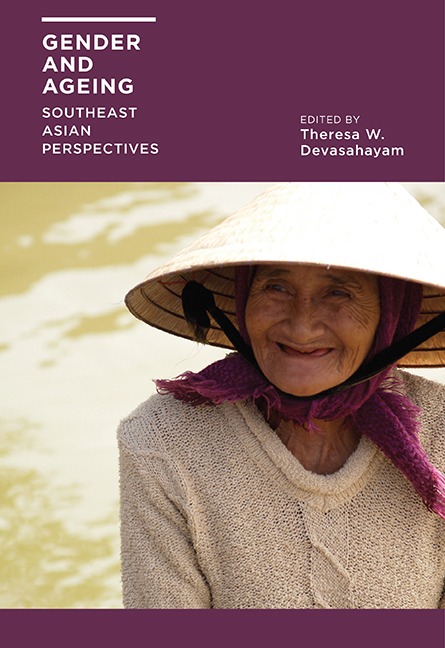Book contents
- Frontmatter
- Contents
- List of Tables and Figures
- Acknowledgments
- Contributors
- 1 Growing Old in Southeast Asia: What Do We Know about Gender?
- 2 Gender and Ageing in Thailand: A Situation Analysis of Older Women and Men
- 3 Gender and Well-being of Older Persons in Cambodia
- 4 Preparations for Old Age and Social Participation of Present and Future Older Persons in Thailand: Gender Difference
- 5 Gender and Health Status among Older Adults in Vietnam
- 6 Ageing and Gender Preferences in Rural Indonesia
- 7 Exploring the Experiences of Older Men and Women in Caregiving and Care-receiving in Sarawak, Malaysia
- 8 An “Active Ageing” Approach to Living Alone: Older Men and Women Living in Rental Flats in Singapore
- 9 Ethnic Patterns and Styles of Active Ageing among Widows and Widowers in Singapore
- 10 Employment Patterns of Older Women in Indonesia
- 11 Gender Differentials in Work and Income among Older Malaysians
- 12 Gender and Economic Well-being among Older Filipinos
- 13 Work, Retirement and the Gender Divide in the Philippines
- Index
1 - Growing Old in Southeast Asia: What Do We Know about Gender?
Published online by Cambridge University Press: 21 October 2015
- Frontmatter
- Contents
- List of Tables and Figures
- Acknowledgments
- Contributors
- 1 Growing Old in Southeast Asia: What Do We Know about Gender?
- 2 Gender and Ageing in Thailand: A Situation Analysis of Older Women and Men
- 3 Gender and Well-being of Older Persons in Cambodia
- 4 Preparations for Old Age and Social Participation of Present and Future Older Persons in Thailand: Gender Difference
- 5 Gender and Health Status among Older Adults in Vietnam
- 6 Ageing and Gender Preferences in Rural Indonesia
- 7 Exploring the Experiences of Older Men and Women in Caregiving and Care-receiving in Sarawak, Malaysia
- 8 An “Active Ageing” Approach to Living Alone: Older Men and Women Living in Rental Flats in Singapore
- 9 Ethnic Patterns and Styles of Active Ageing among Widows and Widowers in Singapore
- 10 Employment Patterns of Older Women in Indonesia
- 11 Gender Differentials in Work and Income among Older Malaysians
- 12 Gender and Economic Well-being among Older Filipinos
- 13 Work, Retirement and the Gender Divide in the Philippines
- Index
Summary
INTRODUCTION
The world has undergone significant demographic shifts since the second half of the twentieth century. Fertility rates have declined significantly—principally because women have gained greater educational levels—and for many of these women, marriage no longer promises the benefits it once did to earlier generations (Bongaarts 1999; Castles 2003; Jones 2003, 2004, 2007, 2009b; Kim 2005). For this reason, marriages are occurring at a later age as young women have found more reasons to resist or at least postpone this rite of passage (Jones 2003, 2004, 2009a). Another staggering demographic shift has been demonstrated by the ageing of populations with a doubling in average life expectancy compared with figures from the last century (Kinsella 2009). While these demographic trends have enormous repercussions on the economies of countries, older persons, in particular, have been labelled as a “burden” by governments since they are seen to place hefty demands on healthcare and social security systems and, in turn, to exert higher pressures on the productive population (Mujahid 2006; Mehta 1997a). Apart from the economic implications of this trend, the impact of population ageing on national security and the sustainability of families has also been flagged as critical concerns deserving of attention (Jackson and Howe 2008; Kinsella 2009).
One thing for certain is that the perception of older women and men has not been the same in the discourse on ageing populations. The social construction of ageing is distinctly gendered in that men and women have been found to experience life differently in their older age in part because of their gender. First, women have an obvious “demographic advantage” in that they live longer than men. This phenomenon which continues across the life course into old age has led to the coining of the phrase ‘feminization of ageing’ which suggests that there are greater proportions of older women than men (Kinsella 2009; Gist and Velkoff 1997). Whether experiencing a longer life expectancy is necessarily an advantage to women, however, is far more nuanced since larger proportions of them compared with older men tend to live greater number of years in disability.
- Type
- Chapter
- Information
- Gender and AgeingSoutheast Asian Perspectives, pp. 1 - 32Publisher: ISEAS–Yusof Ishak InstitutePrint publication year: 2014



